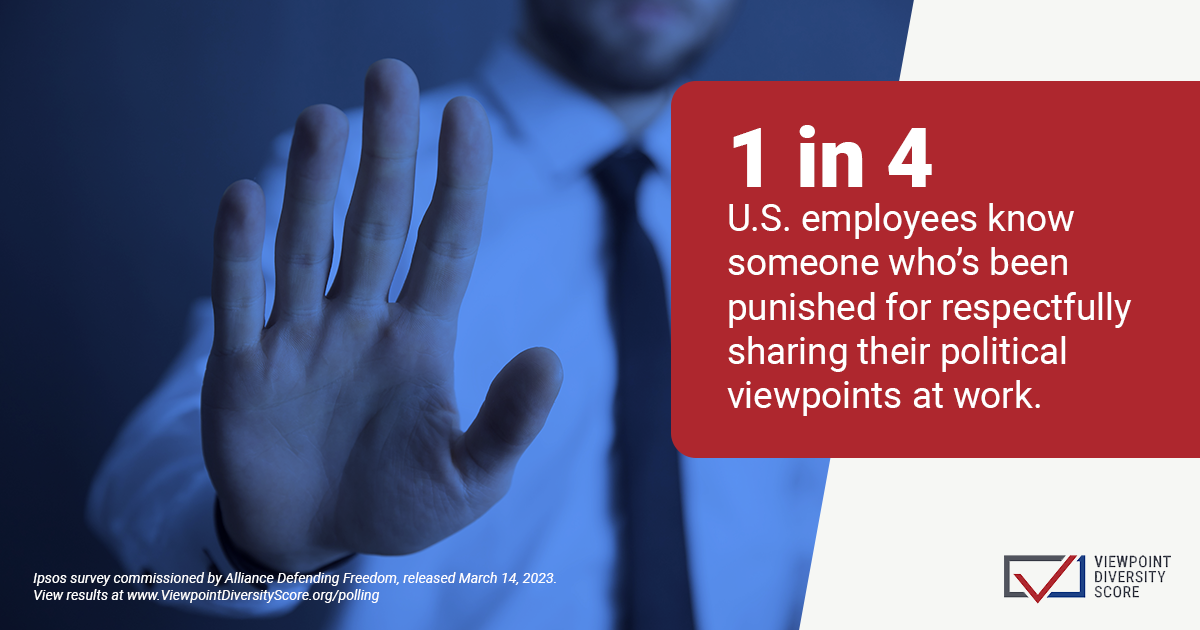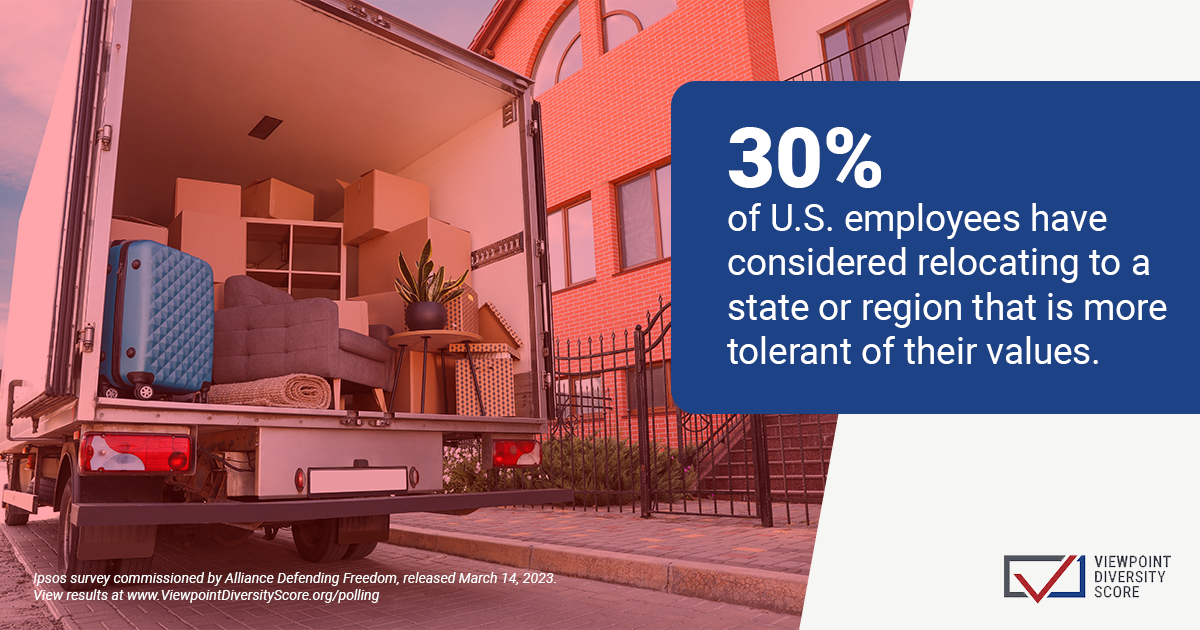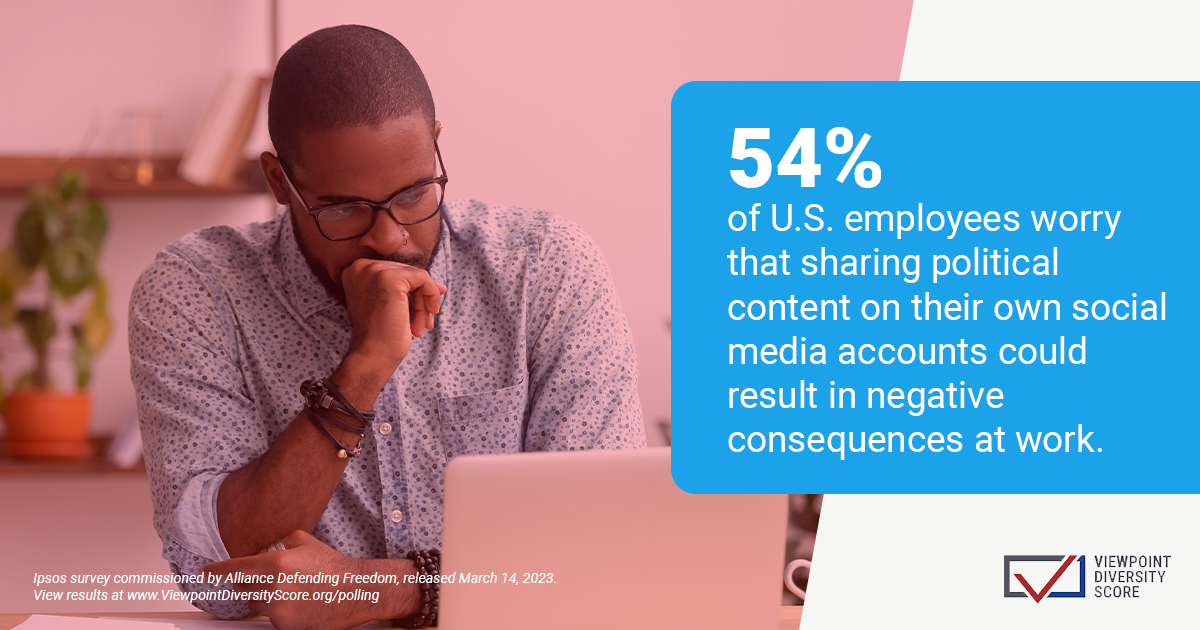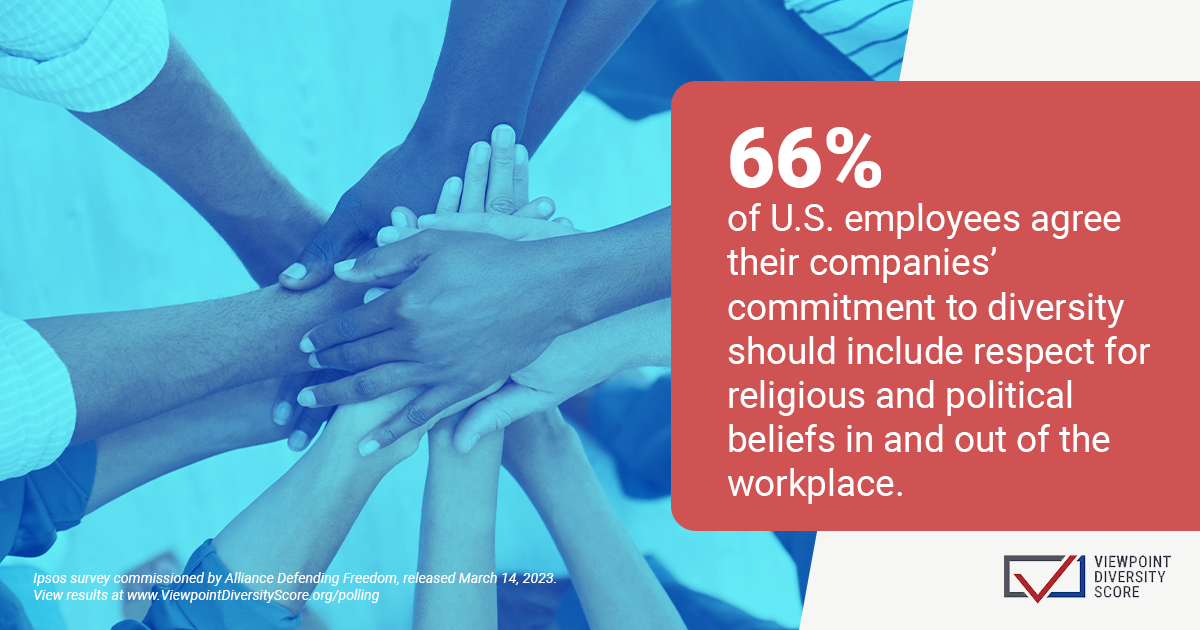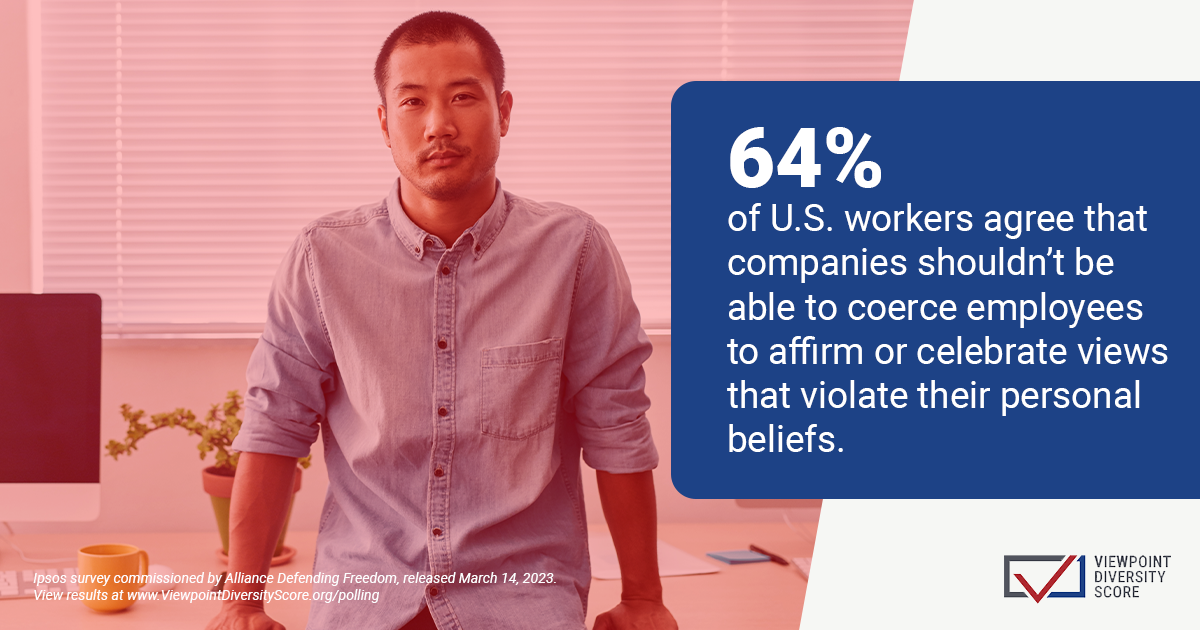Employer: Who is your employer?
Base: All respondents.
Q1: Have you ever not shared an opinion regarding a social or political issue with a colleague or supervisor out of fear that your views could jeopardize your career or professional advancement?
Base: All respondents.
Q2: Have you ever not shared a disagreement or concern you had regarding your company’s direction or a management decision with a colleague or supervisor out of fear that your views could jeopardize your career or professional advancement?
Base: All respondents.
Q3: Do you agree or disagree with the following statement: My company is welcoming of new ideas and perspectives that challenge the status quo?
Base: All respondents.
Somewhat agree
41% (1245)
Somewhat disagree
14% (413)
Strongly disagree
7% (198)
Q4_r: Do you think that respectfully discussing religious views in your workplace is “likely,” “somewhat likely,” or “unlikely” to have negative consequences on your employment?
Base: All respondents.
Somewhat likely
32% (959)
Q4_p: Do you think that respectfully discussing political views in your workplace is “likely,” “somewhat likely,” or “unlikely” to have negative consequences on your employment?
Base: All respondents.
Somewhat likely
37% (1100)
Q4a_r: What negative consequences do you think could result from discussing religious beliefs in your workplace? [Check all that apply]
Base: Believe respectfully discussing religious views in the workplace is “likely” or “somewhat likely, to have negative consequences on employment.
Suspension or Termination
9% (263)
Downgrading in job/demotion
7% (222)
Exclusion from professional development opportunities or opportunities for advancement
12% (356)
Hostile treatment from colleagues or supervisors
18% (527)
All of the above
13% (384)
Q4a_p: What negative consequences do you think could result from discussing political beliefs in your workplace? [Check all that apply]
Base: Believe respectfully discussing religious views in the workplace is “likely” or “somewhat likely, to have negative consequences on employment.
Suspension or Termination
10% (294)
Downgrading in job/demotion
8% (253)
Exclusion from professional development opportunities or opportunities for advancement
12% (372)
Hostile treatment from colleagues or supervisors
19% (572)
All of the above
13% (398)
Q5_r: Have you experienced negative treatment or faced discrimination at work for respectfully communicating a religious viewpoint?
Base: All respondents.
Q5_p: Have you experienced negative treatment or faced discrimination at work for respectfully communicating a political viewpoint?
Base: All respondents.
Q5a_r: What negative treatment or discrimination did you experience as a result of discussing your religious beliefs at work? [Check all that apply]
Base: Have experienced negative treatment or faced discrimination at work for respectfully communicating a religious viewpoint.
Suspension or Termination
5% (161)
Downgrading in job/demotion
5% (162)
Exclusion from professional development opportunities or opportunities for advancement
6% (195)
Hostile treatment from colleagues or supervisors
7% (208)
None of the above
2% (54)
Q5a_p: What negative treatment or discrimination did you experience as a result of discussing your political beliefs at work? [Check all that apply]
Base: Have experienced negative treatment or faced discrimination at work for respectfully communicating a religious viewpoint.
Suspension or Termination
5% (147)
Downgrading in job/demotion
5% (163)
Exclusion from professional development opportunities or opportunities for advancement
6% (181)
Hostile treatment from colleagues or supervisors
9% (274)
None of the above
2% (53)
Q6_r: Has someone you know experienced negative treatment or discrimination at work for respectfully communicating a religious viewpoint?
Base: All respondents.
Q6_p: Has someone you know experienced negative treatment or discrimination at work for respectfully communicating a political viewpoint?
Base: All respondents.
Q6a_r: What negative consequences did they experience as a result of discussing their religious beliefs at work? [Check all that apply]
Base: Someone they know has experienced negative treatment or discrimination at work for respectfully communicating a religious viewpoint.
Suspension or Termination
6% (177)
Downgrading in job/demotion
6% (181)
Exclusion from professional development opportunities or opportunities for advancement
8% (226)
Hostile treatment from colleagues or supervisors
11% (322)
None of the above
1% (24)
Q6a_p: What negative consequences did they experience as a result of discussing their political beliefs at work? [Check all that apply]
Base: Someone they know has experienced negative treatment or discrimination at work for respectfully communicating a religious viewpoint.
Suspension or Termination
5% (142)
Downgrading in job/demotion
6% (168)
Exclusion from professional development opportunities or opportunities for advancement
7% (216)
Hostile treatment from colleagues or supervisors
14% (408)
None of the above
1% (31)
Q7_r: If you are currently in the job market, or were to be in the future, are you more or less likely to apply for a position with a company that has an internal workplace culture that you perceive as hostile to your religious views?
Base: All respondents.
Much more likely
17% (503)
Much less likely
42% (1252)
Makes no difference
28% (838)
Q7_p: If you are currently in the job market, or were to be in the future, are you more or less likely to apply for a position with a company that has an internal workplace culture that you perceive as hostile to your political views?
Base: All respondents.
Much more likely
17% (516)
Much less likely
42% (1249)
Makes no difference
29% (882)
Q8_r: How concerned are you that posting or sharing religious content on your personal social media account(s) could have negative consequences on your employment?
Base: All respondents.
Somewhat concerned
30% (899)
Q8_p: How concerned are you that posting or sharing political content on your personal social media account(s) could have negative consequences on your employment?
Base: All respondents.
Somewhat concerned
33% (1000)
Q9_r: Which, if any, of the following actions should your company take to indicate that it respects employees’ freedom to hold diverse religious views? (Check all that apply).
Base: All respondents.
A company policy that commits to respecting viewpoint diversity in the workplace.
48% (1458)
A company policy that respects the freedom of employees to engage in political activity on their own time, without having to fear repercussions at work.
48% (1432)
A letter or statement from the CEO affirming the importance of viewpoint diversity.
26% (775)
A public commitment to avoid taking stands on divisive social and political issues.
21% (632)
None of the above
24% (722)
Q9_i: Which, if any, of the following actions should your company take to indicate that it respects employees’ freedom to hold diverse political views? (Check all that apply).
Base: All respondents.
A company policy that commits to respecting viewpoint diversity in the workplace.
46% (1398)
A company policy that respects the freedom of employees to engage in political activity on their own time, without having to fear repercussions at work.
50% (1501)
A letter or statement from the CEO affirming the importance of viewpoint diversity.
27% (816)
A public commitment to avoid taking stands on divisive social and political issues.
21% (618)
None of the above
24% (710)
Q7a_1: Parental Rights in Education bills aim to protect the freedom of parents to decide what their kindergarten through 3rd grade children are taught in the classroom about sex and gender identity by limiting what teachers can discuss and requiring notification and consent of parents before sensitive topics can be addressed. Prior to this survey, were you aware of these bills?/Prior to this survey, were you aware of parental rights in education bills?
Base: All respondents.
Q7a_2: Do you personally support or oppose these parental rights in education bills?
Do you personally support or oppose parental rights in education bills?
Base: All respondents.
Strongly support
30% (901)
Neither support nor oppose
31% (943)
Q7a_3: Several companies have publicly opposed state-level legislation aimed at protecting the freedom of parents to decide what their kindergarten through 3rd grade children are taught in the classroom about sex and gender identity. In many cases, this has exposed a large rift between company leaders and some employees and consumers who support such protections. At one major company, anonymous employees wrote an open letter claiming that they fear professional retaliation if their views about the company’s actions become known. Prior to this survey, were you aware of companies publicly opposing state-level protection for parental rights in education?
Base: All respondents.
Q7a_4: How appropriate or inappropriate is it for companies to publicly oppose state-level protection for parental rights in education?
Base: All respondents.
Very appropriate
18% (534)
Neither appropriate nor inappropriate
31% (924)
Very inappropriate
15% (456)
Q7a_5: How comfortable would you be working for a company that takes political positions on contentious social issues in opposition to the views of many employees and customers?
Base: All respondents.
Extremely uncomfortable
17% (513)
Neither comfortable nor uncomfortable
33% (994)
Extremely comfortable
10% (300)
Q10G: Some companies require employee training programs teaching that certain people are complicit in systemic bias based on their race, religion, or sex. These programs teach that such bias may be unconscious and unintentional. Does your company require you to participate in training programs like the one described above?
Base: All respondents.
Q10A: Do you think that it is appropriate for companies to require employees to take training programs that teach that groups of people are complicit in systemic bias because of their race, religion, or sex?
Base: All respondents.
Q10B: Have you or anyone you know ever been asked by an employer to affirm that they are complicit in systemic racism and/or oppression?
Base: All respondents.
Q10C: If a company were to require you to affirm that you are complicit in systemic racism, would you be more or less comfortable respectfully sharing your personal views on issues like racism or bias at work?
Base: All respondents.
Much more comfortable
17% (499)
Somewhat more comfortable
15% (463)
Somewhat less comfortable
19% (566)
Much less comfortable
23% (707)
Q10Ca: Do you think this approach to employee racism and bias training tends to divide colleagues or does it help create unity?
Base: All respondents.
Q10D: Are you more or less likely to trust others and feel included at work if you were told in a company sponsored training that you are complicit in racism or oppression based on your race, religion, or sex?
Base: All respondents.
Much more likely
16% (469)
Somewhat more likely
18% (531)
Somewhat less likely
18% (535)
Much less likely
22% (672)
Q10E: Are you more or less likely to apply for or accept a job offer at a company that requires you to participate in training that teaches that you are complicit in racism or oppression based on your race, religion, or sex?
Base: All respondents.
Much more likely
15% (447)
Somewhat more likely
17% (510)
Somewhat less likely
15% (466)
Much less likely
24% (717)
Q10F: How likely are you to buy from a company, if you knew that the company requires employee trainings that label people as complicit in racism or oppression based on your race, religion, or sex?
Base: All respondents.
Somewhat likely
17% (505)
Somewhat unlikely
16% (479)
Q11E: As you may know, some companies permit employees to form “employee resource groups” (ERGs). These groups allow staff members who share specific characteristics or beliefs to associate in the workplace. Prior to this survey, were you aware of “employee resource groups” (ERGs)?
Base: All respondents.
Q11F: Are you a member of any ERGs?
Base: All respondents.
Q11G: Does your employer allow ERGs based on religion?
Base: All respondents.
Q11H: While many companies permit ERGs that are organized around characteristics like “ethnicity,” “race,” “gender,” and “sexual orientation,” some companies may not allow employees with different religious backgrounds, such as Muslims, Buddhists, Hindus, Jews, Christians, and Atheists to form their own ERGs. Prior to this survey, were you aware that some companies might not allow ERGs to be organized around distinct religious commitments?
Base: All respondents.
Q11A: Are you more or less likely to apply for a job if you know that the company has an ERG that reflects your religious commitments?
Base: All respondents.
Much more likely
15% (437)
Somewhat more likely
18% (533)
Somewhat less likely
14% (415)
Much less likely
10% (291)
Q11B: Do you think that it is “consistent” or “inconsistent” with the principle of diversity for a company to permit staff members to form ERGs based on identifiers such as race, gender, and sexual orientation, but refuse to allow employees of faith to form similar ERGs based on their religious commitments (e.g., Muslim, Buddhist, Hindu, Judaism, Christian, Atheist)?
Base: All respondents.
Q11C: Do you “agree” or “disagree” with the following statement: If a company permits employees to form ERGs based on identifiers such as race, gender, and sexual orientation, they should also allow employees to form ERGs that reflect their religious commitments (e.g., Muslim, Buddhist, Hindu, Judaism, Christian, Atheist)?
Base: All respondents.
Somewhat disagree
12% (354)
Strongly disagree
6% (195)
Q11D: Do you “agree” or “disagree” with the following statement: Companies should treat ERGs equally regardless of whether they are religious or non-religious?
Base: All respondents.
Strongly agree
35% (1046)
Somewhat disagree
9% (280)
Strongly disagree
4% (132)
Q12: Have you ever considered changing jobs to live in a state or region that you felt was more tolerant of your religious, political, and moral values?
Base: All respondents.
No, but I’m considering it
8% (230)
Q13: How likely are you to stop purchasing products or services, or cancel subscriptions from brands that do not respect your values?
Base: All respondents.
Somewhat likely
32% (958)
Somewhat unlikely
13% (398)
No difference/not relevant
23% (706)
Q13a: How much do you trust brands that promote views that oppose your own personal views?
Base: All respondents.
Q14: In the past year, have you stopped purchasing a product or cancelled a service subscription from a particular brand because you disagreed with the company’s stance on a social or political issue?
Base: All respondents.
Not yet, but I’ve considered it
14% (434)
Q14a: If YES, which brands? (shown a number of individuals mentioning)
Base: All respondents.
Q15: In the past year, have you purchased a product or subscription to a service, in part, because you agreed with the company’s stance on a social or political issue?
Base: All respondents.
Not yet, but I’ve considered it
12% (358)
Q15a: If YES, which brands? (shown a number of individuals mentioning)
Base: All respondents.
E1: Do you think that a company’s commitment to “diversity” should include respect for a wide range of religious and political beliefs in and outside of the workplace?
Base: All respondents.
E2: Do you think companies should be able to coerce their employees to affirm or celebrate social or political views that violate their personal beliefs?
Base: All respondents.
E3: Would you be more or less likely to accept a job with a company that terminated employees for requesting a reasonable religious accommodation?
Base: All respondents.
Much more likely
15% (438)
Somewhat likely
14% (422)
Somewhat unlikely
20% (588)
E4: Would you be more or less likely to purchase goods or do business with a company that terminated employees for requesting a reasonable religious accommodation?
Base: All respondents.
Much more likely
15% (449)
Somewhat likely
13% (405)
Somewhat unlikely
21% (636)
